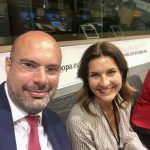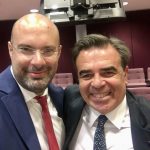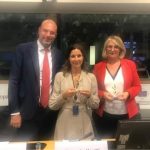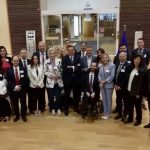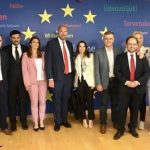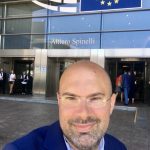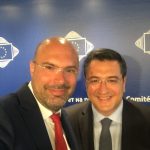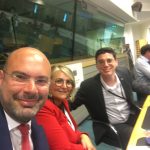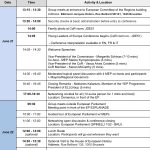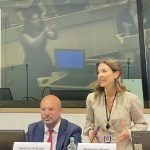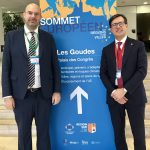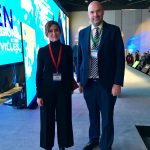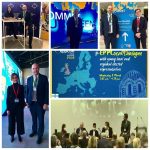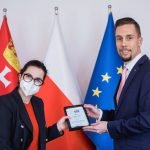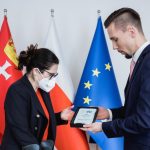The Network of Young MEPs &, MEPs Kympouropoulos (EL-EPP), Peter-Hansen (DK-G/EFA), Vedrenne (FR-RE), and Moretti (IT-S&D), will host a two-day in-person conference of young elected politicians from right across the European Union. The initiative, which falls under the high patronage of the European Parliament and the European Committee of the Regions (CoR), is also actively supported by the CoR Young Elected Politicians Programme (YEPs) and the European Local Leaders Group (ELL). European Commission Vice-President, Mr. Margaritis Schinas, will open the conference. In light of the European Year of Youth, it is pivotal that we give a voice to our young people who are concretely contributing to real change in European politics and beyond. Taking place in Brussels, the conference will seek to give young elected officials a platform to share their ideas and experiences of the local, national, and EU dimensions, including an opportunity to meet their respective European counterparts. More than 80 young elected officials from across the EU will gather in Brussels for the two-day event, with a series of planned debates and discussions set to take place within the most important democratic institutions of Europe. Commenting on the initiative, Greek MEP Stelios Kympouropoulos (EPP), who is also one of the co-hosts of the conference, described how it was now “ time to enhance our common European identity by inviting young politicians to exchange not only views but also best practices and concerns about future challenges. Young politicians should take the floor and contribute to the future of the European Union. I am therefore delighted to be part of this effort to bring together young elected politicians in Brussels.”“With an incredible team effort, different MEPs from the four biggest political parties represented at the European level, have joined forces across party lines, to develop an initiative that aims at bringing together young leaders of Europe, ” said Alessandro Da Rold, Managing Director of EU40 – the network of young MEPs. “This has never been done before,” he emphasised. An occasion for the participants both to learn in greater depth how the EU institutions function while also giving a platform for discussion in relation to the significant challenges and opportunities that Europe faces. Italian MEP Alessandra Moretti (S&D), and co-host of the event, noted how “young politicians represent the fabric of our societies and the future of Europe. However, too often their voices have been neglected, and still are. Despite an ageing political environment, we need to hear them carefully and thoroughly. As we aim to change the European rules (i.e. Treaties) for a better and more powerful Europe of tomorrow, we would need to put forward young leaders’ ideas right now.” The gathering will give the floor to the young elected leaders themselves, facilitating them to have their voices heard while also allowing two levels of politics to meet and discuss the pressing issues of the day. “We need better representation of the younger generations across Europe. The younger you are, the longer you have to live with the political decisions being taken, and of course we need to have a say in what local, regional, national, and European societies we want to build and live in,“ stressed Green MEP Kira Marie Peter-Hansen from Denmark. Continuing, the 24-year-old Danish legislator states, “as the youngest MEP ever elected, I understand how difficult it can be to try and change the ways of those who came before me. And I think we can learn a lot from each other across the EU. I am therefore delighted to be part of this effort to bring together young elected politicians in Brussels for this event”. On the first day, the main opening conference will take place at the European Committee of the Regions, during which assembled panels consisting of several MEPs will engage with the young elected leaders. Echoing her colleagues’ sentiments, French MEP and event co-host Marie-Pierre Vedrenne stated, “as a young elected MEP who is new in politics, I know how important it is to build personal relationships with other young elected leaders. It is crucial for us to better understand our different political cultures, to overcome our differences, and finally, to take the best decisions together for our common future. Encouraging youth participation, building bridges between pro-European parties, and reinforcing citizen knowledge of how the EU functions, are key to making the EU more democratic, more accessible, and more fit for the challenges of the future. This first conference effort has been a success and I hope it can be repeated in time.” The initiative, which was largely inspired by the Conference on the Future of Europe, and the European Commission instigated‘European Year of Youth 2022,’ will adopt the theme‘citizen participation,’ especially as it relates to ‘youth engagement,’ and how this can foster a sense of democratisation, inspiration, and hope for our future. Emphasising the necessity for European collaboration, Mr. Vasco Alves Cordeiro, First Vice-President of the European Committee of the Regions, noted how “building these exchanges among young politicians across different political levels is key for the future of our Union. Learning from each other and developing new ideas together will help deliver better quality results for our people, both at the local and EU level. I look forward to strengthening our cooperation between the European Committee of the Regions and EU40 to support youth engagement and participation in our regions and cities.” And lastly, bringing to the fore the importance of local and regional European cooperation, President of the ELL group and member of the Young Elected Politicians programme, Nektarios Kalantzis, notes how, “cities have the potential to play a major role in dealing with many of the critical issues faced in Europe today, by becoming key drivers of the twin green and digital transformations. The exchange of good practices between European regions and municipalities is more important today, as technology allows the faster development of innovative practices and applications from one European city to another. Europe’s young leaders should thus become stakeholders in changing Europe, knowing that the young generations of today will be the future leaders of tomorrow.”
The Network of Young MEPs & MEPs Stelios Kympouropoulos (Greece, EPP), Kira Marie Peter-Hansen (Denmark, Greens/EFA), Marie-Pierre Vedrenne (France, RE), and Alessandra Moretti (Italy, S&D), will host a two-day in-person conference of young local elected politicians from across the European Union. The initiative, which falls under the high patronage of the European Parliament and the European Committee of the Regions, is also supported by the Young Elected Politicians Programme and the European Local Leaders Group. Taking place in Brussels, the conference will seek to give young politicians, approximately 70 in total, the opportunity to meet their respective European counterparts, to share their ideas and experiences of the local, national, and EU dimensions, and to learn in greater depth how the EU institutions function. The gathering will give the floor to the young elected leaders themselves, facilitating them to have their voices heard, while also allowing different levels of political governance to meet and discuss the pressing issues of the day. The initiative itself was largely inspired by the successes of the Conference on the Future of Europe, and the European Commission instigated “European Year of Youth 2022.” With few specifically youth oriented events planned for this year, the Young Leaders of Europe Conference was deemed to be both a necessary and timely inter-institutional venture. The two-day event will kick-off on June 21st at 14:30 at the European Committee of the Regions (CoR), during which an assembled panel consisting of MEPs, Mayors and Regional Governors, will engage with the young elected leaders. Senior figures from both the Commission and the CoR will be among those making opening remarks. The theme ‘citizen participation,’ especially as it relates to youth engagement, and how this can foster a sense of democratisation, inspiration, and hope for our future societies, will be the focus point for discussion. A networking cocktail will follow the proceedings later that evening. On the morning of day two, June 22, conference participants will visit the European Parliament, during which further concluding discussions/presentations are planned to take place, including a formal institution tour. The conference will draw to a close that afternoon.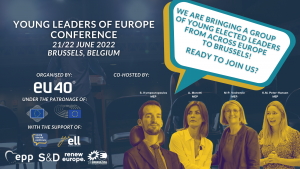
Nektarios Kalantzis, the President of the European Local Leaders -ELL Group visited #Berlin and #Rostock, 9-12 May, 2022. He spoke with representatives from the Deutscher Bundestag, Bundesministerium für Wirtschaft und Klimaschutz, Deutscher Industrie- und Handelskammertag e.V. (DIHK), @BDI – Bundesverband der Deutschen Industrie, Konrad-Adenauer-Stiftung, TLGG, @ROSTOCK PORT GmbH, OTC Ocean Technology Campus Rostock, IHK zu Rostock, @Hanse- und Universitätsstadt Rostock #SmileCityRostock and @Bürgerschaft of Rostock! His topics could not be more contemporary: #Digitalization and #Energy #Transition were the pillars, around which he discussed about sustainability and future plans. He found common ground and exchanged experiences on good and bad practices. #team #technology #sustainability #economics #future #energytranstition #energyefficiency #digitalization
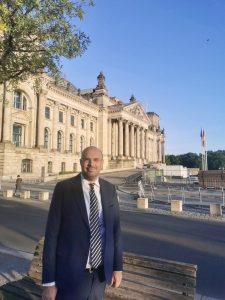
The European Young Leaders represent an alternative infrastructure of leadership, a new generation of leaders able to inspire action and generate change. Their passion, their diversity of backgrounds and opinions, and their innovative thinking together create the right formula for generating fresh ideas to build a more forward-thinking Europe.
Our European leaders provide alternative perspectives from outside the institutional and political frameworks to EU decisionmakers writing the rule book.
The European Young Leaders also play the essential role of helping to reconnect people with and rebuild trust in politics by engaging a wider community around key EU policy issues that need a whole economy whole society approach to progress fast. They are scientists, artists, journalists, entrepreneurs, astronomers. They are citizens and their thinking is not bound by multilateral or frameworks, or burocracy.
They help take Europe out of Brussels, in their own countries and cities. They are facilitating citizens’ participation in the creation of a more equal, innovative and inclusive Europe and help build a European identity.
From champions of the arts and tech entrepreneurs, to leading activists and Olympic athletes, meet the new young leaders.
Nektarios is a Greek politician with a passion for good local governance. He currently serves as the President of the European Local Leaders, a committee of young European politicians that have been elected at the regional or local level. The initiative aims to promote creativity and share pioneering ideas among the new generation of locally elected officials throughout cities across Europe, with a focus on climate change, environmental protection, smart cities and new technologies. Nektarios is also the President of the Union of Young Local Councillors of Greece, which brings together newly elected regional and municipal councillors, governors, deputy mayors and mayors in Greece and organises events on the role of local governments in the development of smarter and greener cities.
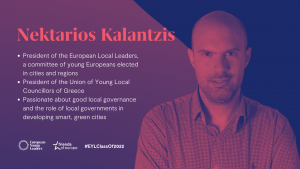
“The strongest weapon of the European Union remains democracy, founded on basic principles and values including respect to the rule of law, freedom and solidarity.” Olgierd Geblewicz, President of the EPP Group in the European Committee of the Regions (EPP-CoR) made these remarks when addressing an EPP Local Dialogue with young local and regional elected representatives (YEPs) ahead of the Summit of Regions and Cities (2-4 March 2022) taking place in Marseille.
Geblewicz, who is President of West Pomerania Region told YEPs that he got engaged in politics because as a young person he wanted to bring about change. “Looking back I see that important results have been achieved and I encourage you to get engaged and bring about change in your local communities”.
Apostolos Tzitzikostas, President of the European Committee of the Regions (CoR) told youths “Your generation, the young generation, has lived in a Union without wars and without walls. You are a generation that knows Europe as it is, but you must be eager to forge our Union as it should be: A Union which is less bureaucratic that focuses on the real needs of its citizens, with decisions taken as close as possible to the people and the places they live in. A resilient Europe forged with our values: Democracy, unity, solidarity, subsidiarity, rule of law.”
Strengthening European Democracy through youth engagement
Jelena Drenjanin, EPP-CoR 1st Vice-President who moderated the first panel said “The European Year for Youth is just a starting point. It’s an occasion that we cannot miss to foster civic engagement of young people in a broader way, leading to a change in the mind-set: young people are not only the future. They are first and foremost the present, and the moment has come to politics to respond to their calls.”
Rafał Trzaskowski, Mayor of Warsaw said “The people of Ukraine are not only fighting for their security but they are also fighting for our democracy. This is why I encourage young politicians to get engaged and show solidarity.”
MEP Antonio López-Istúriz White, EPP Secretary General said that the concept of democracy has perhaps never been more important. “In this dark moment of our history, rights and freedoms are being restricted, war has been provoked on our continent and people are being used as pawns in the name of democracy.” He added that the future of Europe depends on how young people see and how close they feel towards the European Union.
Miroslav Behúl, Municipal Councillor of Bratislava-Petržalka (Slovakia) who co-created the Youth parliament of Bratislava-Petržalka which serves as an advisory and initiative body of the local council and mayor said “It is important to create possibilities for young people to engage in public affairs, such as youth parliaments and school councils. Such engagement of young people is the most effective way to deliver the experiences to young people and to strengthen European democracy.”
Francine Farrugia, Local Councillor of Siggiewi (Malta) expressed disappointment that the local level was experiencing centralization by the national government. “It is key to give local councils and young councillors room to work as the local level is the first voice of local communities and this leaves and impact on trust in politics.”
Sophia Kircher, Vice-President of the Tyrolean Parliament (Austria) said “The decisions we are making today do have a long-lasting impact on the future of the next generations and today’s youth. That is why it is necessary and important that young people are involved in the decision-making processes. This is the only way how generational equity in politics can work. Therefore, it is important and to establish youth councils in which young people can participate and work together on future projects, such as the EU-Strategy for the Alpine Region (EUSALP) Youth Council.”
Young local and regional politicians leading green and digital transformation on the ground
Ricardo Rio, Mayor of Braga who moderated the second panel said that making digitalisation work for everyone, and investing in green and sustainable projects means making citizens lives easier, and healthier as well as supporting small and medium businesses – the backbone of local economy and employment – by simplifying rules and reducing administrative burdens. Rio who served as the CoR Rapporteur on the SDGs said “Unfortunately, we can still see a widespread divide between rural and urban areas in terms of coverage of digital infrastructures, and the digitalisation of the interaction between public authorities and business is still insufficient.”
Martin Heinen, Chairman of the Garzweiler Landfolge (Germany) who is involved in restructuring the energy industry in a coal mining area said “A breakthrough into the future does not require two or three major projects, but the right form of ongoing dialogue between the authorities and the population. This is how progressive projects can be implemented at the right time and in the right place.”
Micael Lamego dos Santos, Municipal Councillor of Tabuaço (Portugal) who is involved in projects to reduce municipal waste “Young politicians are key to a successful transition to a clean and circular economy. Our dynamism and creativity must be to boost all environmental projects. We have to be capable to mix our proactive approach with the voice of experienced politicians and citizens.
Nektarios Kalantzis, Municipal Councillor of Pallini Municipality (Greece), President of the European Local Leaders said that the exchange of good practices between European regions and municipalities is more important today, as technology allows faster development of innovative practices and applications from one European city to another. “Europe’s young leaders should become stakeholders in changing Europe, in order to make our cities modern and innovative. Climate change, smart cities, artificial intelligence, should be the priority of the new generation of elected officials in Europe’s cities.”
Lídia Pereira, President of YEPP and MEP said “The green and digital transitions will bring many new opportunities. Young people must be the protagonists and also the main beneficiaries of this change we have ahead of us. Reconciling environmental sustainability and economic growth is possible and will create better jobs.”
Addressing the event was also Franck Proust, EPP Vice-President and President of Nîmes Métropole said that experience and the voice of youths are complimentary. He said “I have a message for YEPs. Do not be afraid, get engage, believe in yourselves, work together and with people who have experience and other youths to build the future of Europe and strengthen European democracy.”
In the concluding remarks, MEP Maria Walsh, said that the European Year of Youth 2022 is a year that honours and supports the generations that has sacrificed the most during the pandemic. The Youth of Europe. She stressed “This EU year ensures that we focus on giving a strong voice to our young people, when it comes to shaping policies. In the coming year it is essential that we listen, engage and collaborate with our young Europeans. It is simply not good enough if we transition from this pandemic and not have young voices at the decision making table.”
The event was presented by Chris Burns.
Ellgroup- Christmas Greetings from:
- Tallinn: Laura Danilas, Municipal Councillor of Tartu Municipality, Estonia

- Madrid: Elena Álvarez Brasero, Regional Deputy of the Community of Madrid, Spain
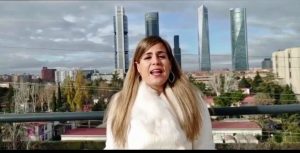
- Ljubljana: Julija Humar, District Councillor of Ljubljana Municipality, Slovenia

- Reykjavík: Alexandra Briem, President of Reykjavík City Council, Iceland

- Vienna: Julia Heinrich, District Councillor (BezR) of Vienna Municipality, Austria

- Rovaniemi: Susanna Junttila, Chair of Executive Board of Rovaniemi Municipality, Finland

Brussels November 1, 2021
Based on our common European origins and roots, the need for understanding between peoples and the need to exchange cultures, the cooperation between the young people of Europe, the so-called Next Generation EU, which will shape the next day in Europe, is more important than ever.
The creation of the Committee of Young Elected Europeans in Cities and Regions, known as European Local Leaders (ELL) is a first in Europe and is a European initiative, with elected young people from all over Europe.
In an effort to promote and contribute to a better future for local governance, we are creating the first European Council of Young Local Leaders (ELL) for young elected leaders in cities and regions across Europe, to discuss the problems of local governance in all parts of Europe, to propose solutions by sharing good practices and to give them the best possible tools and knowledge, helping them to become the young European leaders of tomorrow.
From today, hundreds of young people involved in local government in Europe – elected in cities and regions across Europe – will have the opportunity to come closer and understand better the different cultures that make up Europe’s cultural unity.
The exchange of good practices between European regions and municipalities is more important today, as technology allows the faster development of innovative practices and applications from one European city to another.
Europe’s young leaders should become stakeholders in changing Europe, with the young generation ahead, ELL Under40, under the greatest pressure and called upon to carry the greatest burdens for the Europe of tomorrow, in order to make our cities modern and innovative.
Climate change, smart cities, the use of new technologies, robotics and artificial intelligence, urbanisation, in conjunction with environmental protection, as well as tackling social inequality, should be the priority of the new generation of elected officials in Europe’s cities, where sharing good practices and know-how from other cities is the only way to make our cities innovative and more creative.
Digital governance, e-government, e-services, cycling networks, electromobility, renewable energy and greenery are at the forefront, as our own European history, our human potential, our European heritage, demand that we lead the way to make Europe stronger and more powerful for tomorrow.
The Executive Committee of European Local Leaders (ELL) consists of 100 +1 members from more than 30 countries in Europe, with gender (women and men) represented on an equal basis and in equal numbers.
They are young mayors and young municipal and regional councillors up to 40 years old, from as far away as Rovaniemi in Lapland and Reykjavik to Athens and from the Atlantic coast in Portugal to Belfast, Dublin, the Baltic and the Carpathians.
For a strong and fair Europe!
For more information, visit our website: www.ellgroup.eu
The President,
Nektarios Kalantzis
Like every year, this year World Environment Day will be celebrated on Wednesday, June 5, 2021. Like the previous years, this year World Environment Day Theme 2021 is “Ecosystem restoration”. The theme is selected to create consciousness about resetting our relationship with nature. The United Nations Environment Program declared this theme the previous year.
Nature is sending us a clear message. We are harming the natural world – to our own detriment. To care for humanity, we must care for nature. We need our entire global community to change course.
It is time for all of us to think again what we buy and use. It is time to adopt sustainable habits, farming and business models, keep safe the wild spaces and wildlife and commit to a green and resilient future.
It is time to work together, it is time to put nature where It belongs-at the centre of our decision making. The role of our cities and regions is very important.
Urban areas occupy less than 1 per cent of the Earth’s land surface but house more than half of its people. Despite their steel and concrete, crowds and traffic, cities and towns are still ecosystems whose condition profoundly marks the quality of our lives. Functioning urban ecosystems help clean our air and water, cool urban heat islands, shield us from hazards and provide opportunities for rest and play. They can also host a surprising amount of biodiversity.
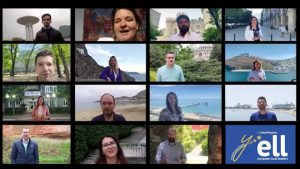
European Local Leaders created a video to pass the message across Europe. Our message for the World Environment Day is clear “It Is time for Nature, it is time for the future ”.
If we are to safeguard the environment for future generations, we must take urgent action now to implement development policies, incentives and actions. It is through working together that we will succeed in delivering a sustainable, healthy, and prosperous future for all.
“IT IS TIME NATURE, IT IS TIME FOR THE FUTURE"
The ELL Team
So young, but so tired. European Union, an edifice of only 65 years old and yet so exhausted.
Europe was built on the foundations of peace, wellbeing and freedom among its member states.
However, the amount and complexity of the procedures which were adopted to implement the European integration, the so-called technical part, overlapped the European vision.
At the same time, for most of the member states their national interests were appeared to be stronger than the European regulations which they themselves had voted for.
Plenty of them were living beyond their means, ignoring for years the upcoming consequences. The human value and the human rights were constantly downgraded, and the European Institutions were proved incapable to deal with.
The European crisis was deteriorated during the last decade and BREXIT was the result. A shock we owe to consider very rigorously together with the European dilemma of stay or leave which exists in all member states.
However, against the great challenges we are facing, there is no doubt that Europe is our common future. Moreover, whatever keeps us together is stronger than what tears as apart.
Lessons should be learnt from the past; the European vision should be re- established. Planning should not be based on strict processes but on realistic policies which will not only regulate the markets, but will also enhance human value, entrepreneurial
freedom and social justice.
We are Europe, and we need to work hard for it.
